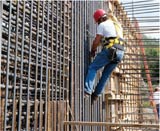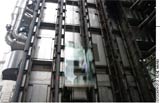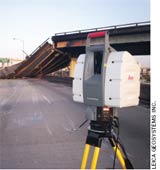
March 2009
- Living on the Edge: PPE answers workers' needs at heights
- Hearing, Head & Face Protection: Effective programs, guaranteed
- Heat Stress: Following California's lead
- ASSE 2009 Preview: Remember to visit the Alamo
Click here to subscribe.
Features

By Ronnie Rittenberry
Remember the Alamo? If so, you may recall that it was originally named Misión San Antonio de Valero and became the Shrine of Texas Liberty 173 years ago this month when, on the morning of March 6, 1836, the last of Col. William B. Travis’ 189 woefully outnumbered “Texian” and Tejano fighters finally succumbed to what seemed a sea of Mexican soldiers led by General Antonio López de Santa Anna. The battle was pivotal in Texas’ fight for independence, which it achieved the following month, and it remains one of the all-time heroic struggles against impossible odds. Historians say Santa Anna’s men numbered 4,000.

By James Preacher
It is a dangerous business to make your living hundreds of feet off the ground. We’ve come a long way from the cavalier attitude so often depicted in the popular prints of the Rockefeller center construction project: the long line of ironworkers having their lunch on a suspended beam high above the ground.

By Fred Elliott
A program to prevent heat illness will protect workers’ health and also improve the safety of your operation, because even mild heat illness can impair an employee’s judgment and performance. Workers are also more productive when they are protected from heat illnesses.
By Linda J. Sherrard
We know the basics of head and face protection: impacts, flying particles, glare, radiation, and chemical exposure are givens, as is bloodborne pathogens exposure for medical personnel. Injuries range from the simplest scrapes to deaths and activities from medical care to heavy construction. Most companies have the physical items of PPE to work safely in all types of situations. Considering the potential for a workplace head/face injury, is basic really enough?
By Frank Pennachio
A recent survey of nearly 100 employers regarding their worker’s compensation policies and practices, conducted by Occupational Health & Safety and Injury Management Partners LLC, demonstrated some alarming findings. The most disconcerting result was that nearly 60 percent of the respondents did not know how their insurance companies, third-party administrators (TPAs), or managed care organizations (MCOs) were compensated for the building and management of medical provider networks.
By Theresa Y. Schulz
For years, we’ve known many workers in the “real world” do not achieve the same amount of attenuation from hearing protectors as indicated on the EPA required Noise Reduction Rating (NRR) label. Numerous studies show the NRR greatly overestimates the amount of attenuation that workers get in the field. This problem is so widely accepted that OSHA recommends de-rating the NRR by 50 percent. However, studies also show that a one-size-fits-all de-rating is also inaccurate when compared to individual measures of attenuation. EPA will soon make an announcement proposing a major change in the required labeling and method of testing of hearing protection devices (HPDs).
By Rob Brauch
It’s late in the afternoon on a Friday at International Meta-Multi-Mega Manufacturing Inc.’s corporate headquarters, and Bill, the manager of Safety, Health and Environmental Services, is on the hot seat regarding management’s latest concerns about compensation liability. The director of Finance, Samantha, is anxious to get some answers. The HR manager, Hector, nods in agreement.
Departments
By Michael E. Bingham
We select several management and labor employees to be on the team, get the “lucky members” together, and get them all pumped up. They’re ready to rumble! Next, we announce the committee’s first assignment is to rebuild the engine and transmission in the company van. Once they do the rebuild, their next task is to meet once per quarter to service the van and keep it in tip-top running order.
By Jerry Laws
Mark your calendar on Tuesday, April 21, if you’re an occupational health nurse, if you work with OHNs, or if you appreciate their contribution and keep an eye on health costs. April 21 is the day Kay N. Campbell, incoming president of the American Association of Occupational Health Nurses, will speak at its annual conference about the Re- Visioning project and plans for AAOHN’s future. A new name may be coming, along with new goals and new activism and outreach, she told me Jan. 26.
By Robert Pater
Music not only “hath charms to soothe a savage beast, to soften rocks, or bend a knotted oak” (William Congreve), rhythmical principles can elevate your leadership. And you don’t have to play an instrument or sing to realize positive gains.

By Ronnie Rittenberry
Needless to say, the elevator industry has its ups and downs. On the upside, earnings for those who install, repair, and maintain the systems are among the highest of all construction trades, and the benefits are usually good. On the downside, the work involves heavy equipment with moving parts, often cramped quarters, and sometimes very deep shafts.

By Marc Barrera
The first and most important objective in the hierarchy of controls is the elimination or substitution of a hazard. This principle was also the impetus for the creation of Leica ScanStation 2, which is manufactured by Heerbrugg, Switzerland-based Leica Geosystems AG. This mobile laser scanner features an embedded high-resolution camera and a high-definition, 3D laser scanning system that can quickly map an environment in 360 degrees, collecting 50,000 measurements per second to create a photorealistic view of any setting.